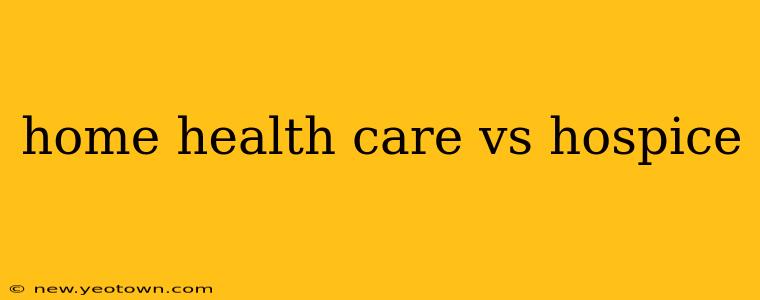The prospect of needing home healthcare or hospice can be daunting. Both offer care in the familiar comfort of one's home, but they serve very different purposes and cater to distinct needs. This isn't a simple "either/or" situation; in fact, many individuals transition from home health care to hospice. Let's unravel the key differences to help you understand which might be right for you or a loved one.
Imagine this: Mrs. Gable, a vibrant 85-year-old, recently had a hip replacement. She's recovering well but needs assistance with daily tasks like bathing and dressing. This is where home healthcare steps in. On the other hand, Mr. Davis, diagnosed with terminal cancer, is nearing the end of his life and focusing on comfort and pain management. This is the role of hospice care.
What is Home Healthcare?
Home healthcare focuses on improving or maintaining a patient's health and independence. It's designed for individuals recovering from an illness or injury, managing a chronic condition, or needing assistance with daily activities. Think of it as support to help someone live as fully as possible at home.
Types of Services Offered by Home Healthcare:
- Skilled nursing: Administering medications, wound care, monitoring vital signs.
- Physical therapy: Regaining strength and mobility after surgery or illness.
- Occupational therapy: Adapting daily tasks to manage limitations.
- Speech therapy: Improving communication and swallowing abilities.
- Medical social work: Addressing emotional and social needs, connecting patients with resources.
- Home health aides: Assistance with bathing, dressing, meal preparation, and light housekeeping.
What is Hospice Care?
Hospice care is a specialized type of care focused on providing comfort and support to individuals with a terminal illness. It emphasizes quality of life over curative treatments when a life expectancy of six months or less is anticipated, regardless of diagnosis. The goal is to alleviate pain and suffering, allowing the individual to live as comfortably and peacefully as possible during their final stages of life.
What Services Does Hospice Provide?
- Pain and symptom management: Controlling pain, nausea, shortness of breath, and other distressing symptoms.
- Emotional and spiritual support: Counseling for patients and families coping with grief and loss.
- Respite care: Temporary relief for family caregivers.
- Bereavement support: Grief counseling for the family after the patient's death.
- Medical equipment and supplies: Providing necessary equipment, like oxygen tanks or hospital beds, at home.
Home Healthcare vs. Hospice: Key Differences Summarized
| Feature | Home Healthcare | Hospice Care |
|---|---|---|
| Goal | Improve or maintain health, promote independence | Provide comfort and support at end-of-life |
| Patient Status | Recovering from illness/injury, managing chronic condition | Terminally ill with a life expectancy of 6 months or less |
| Treatment Focus | Curative or preventative | Palliative (comfort-focused) |
| Length of Care | Variable, can be short-term or long-term | Typically continues until death or the patient chooses to discontinue care |
How Do I Know Which One I Need?
Choosing between home healthcare and hospice is a crucial decision, often made with the guidance of a physician. Factors to consider include:
- Your or your loved one's medical prognosis: Is the illness life-threatening and terminal?
- Treatment goals: Are you focused on treatment to cure or improve the condition, or is the focus on pain management and comfort?
- Quality of life: How important is maintaining independence and daily activities versus ensuring peace and comfort in the final stages of life?
Can Someone Receive Both Home Health Care and Hospice?
While uncommon, it's possible for an individual to receive both simultaneously, especially if they have a chronic condition along with a terminal illness. However, this would typically require careful coordination between the home health care team and hospice team.
Frequently Asked Questions (FAQs)
Who pays for home healthcare and hospice?
Both home healthcare and hospice services are often covered by Medicare, Medicaid, and private insurance plans, but the specifics vary depending on your coverage. It's important to check with your insurance provider to understand your benefits.
Can home health care transition to hospice?
Yes, absolutely. Many individuals who initially receive home healthcare for a chronic condition may eventually transition to hospice care as their condition worsens and becomes terminal. This is a common and natural progression.
What is the difference between home health aides and certified nursing assistants (CNAs)?
While both provide personal care, CNAs usually work in a skilled nursing facility or hospital setting, while home health aides provide care in a private residence. Both types of care providers typically have undergone training and background checks.
Understanding the nuances of home healthcare and hospice care is crucial for making informed decisions during challenging times. This knowledge empowers families to advocate for their loved ones and ensure they receive the appropriate level of care and support. Remember, consulting with healthcare professionals is essential in navigating this complex landscape.

